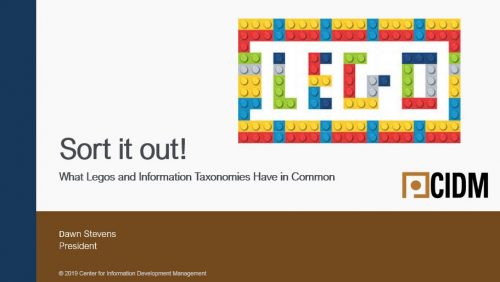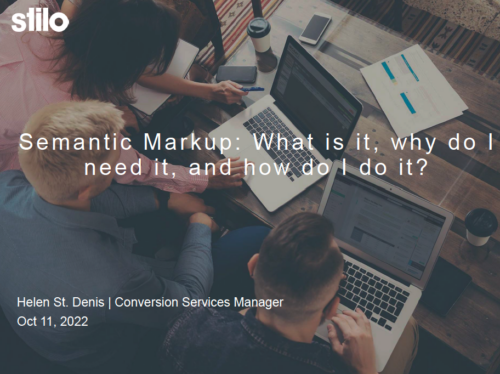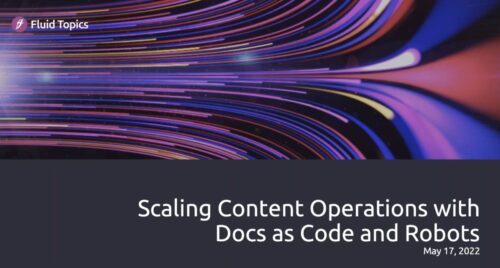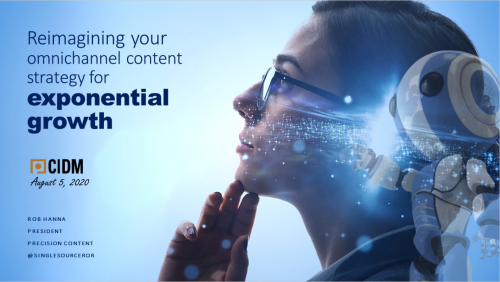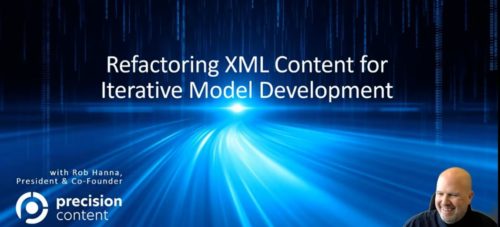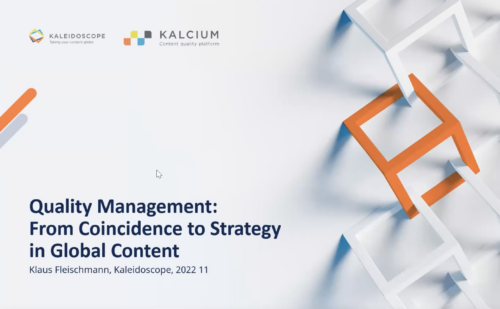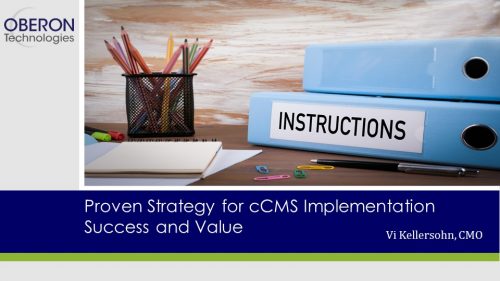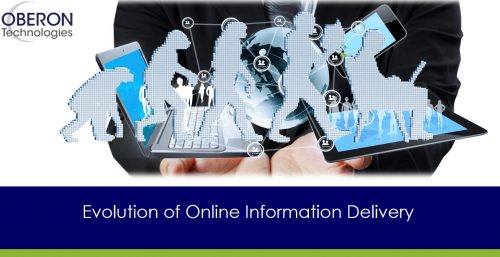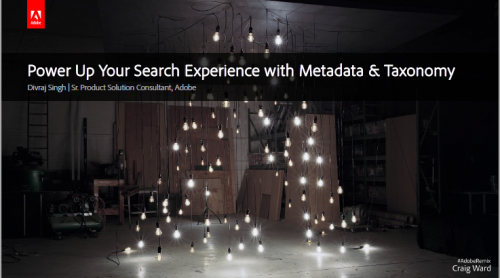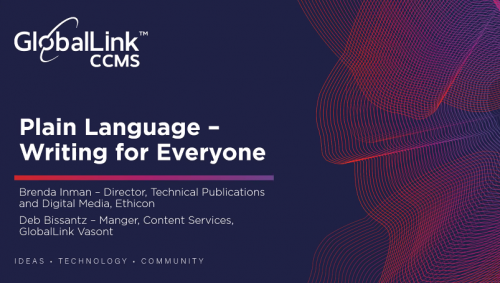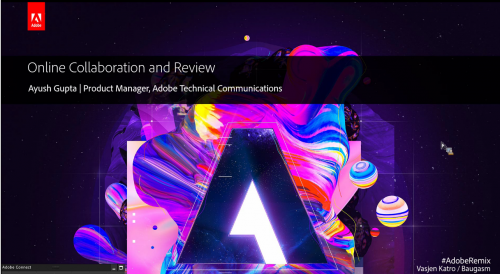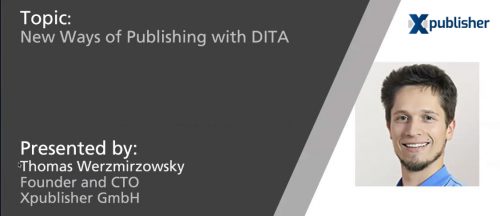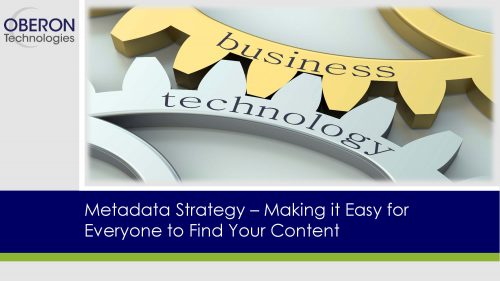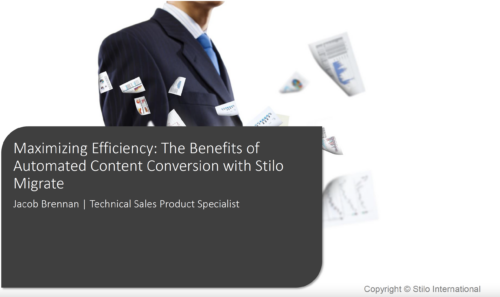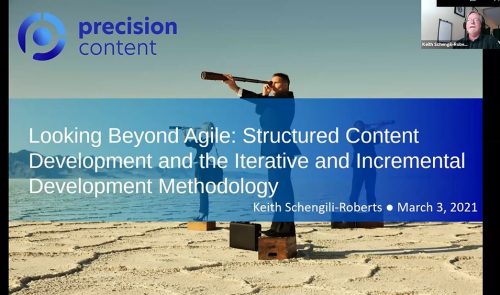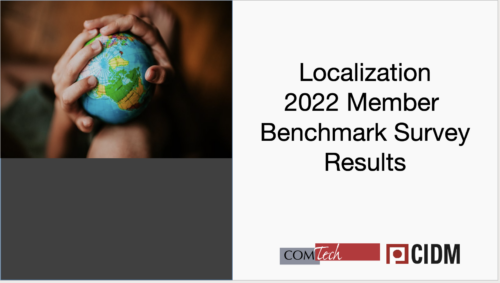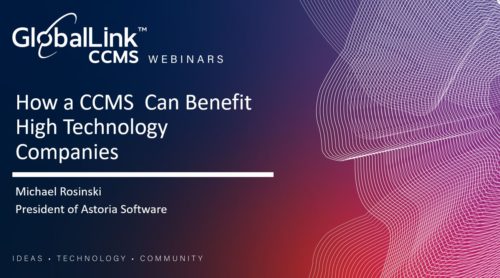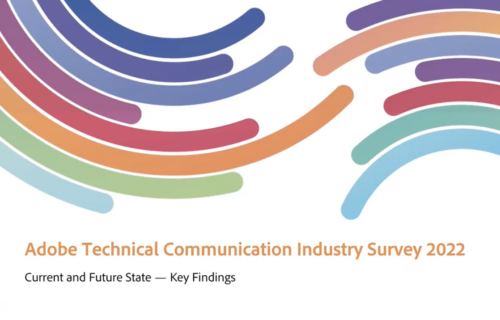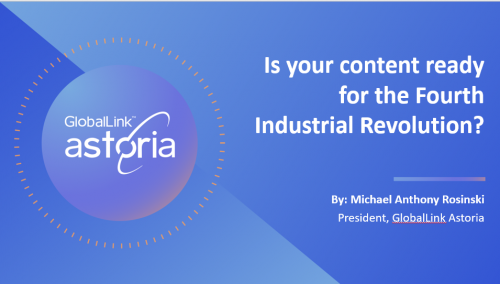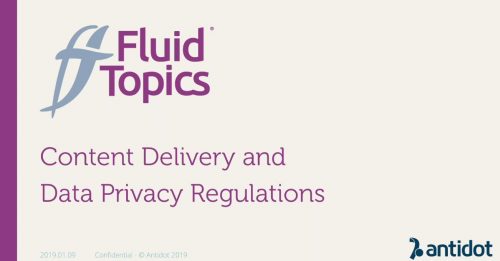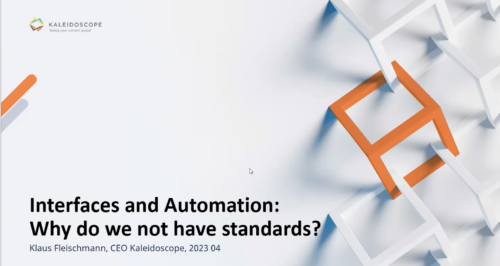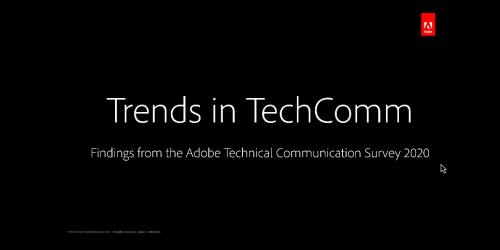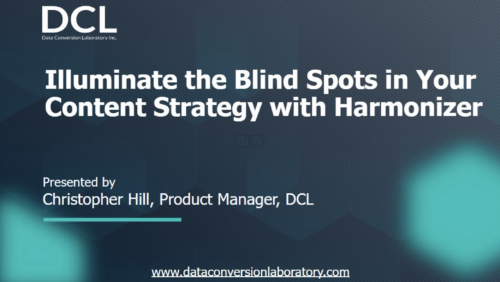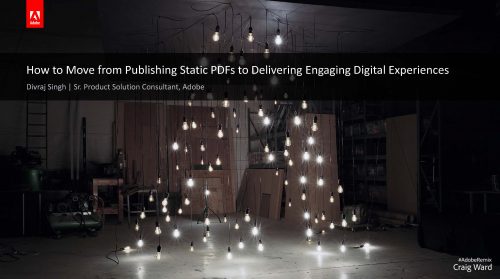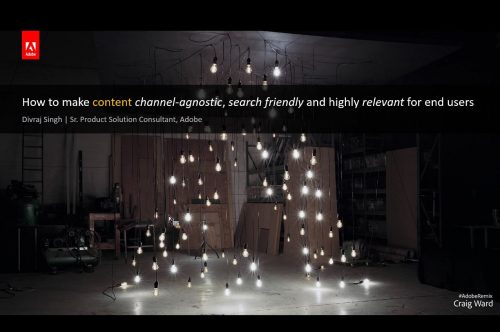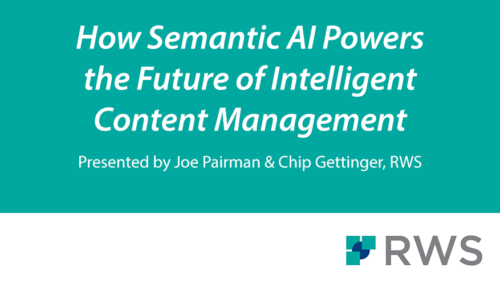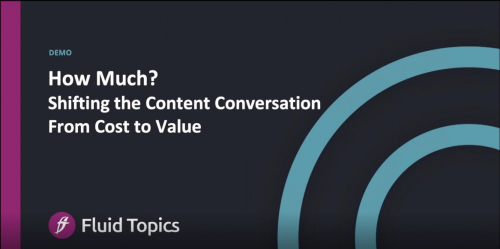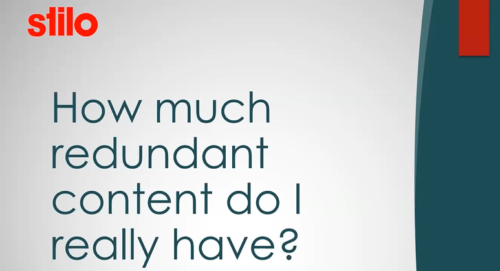-
August 28, 2019 Looking for a single piece of content on a web site is often compared to digging in a giant bucket of LEGOs for a single unique piece – an often frustrating and futile endeavor. If those LEGOs are sorted by certain distinguishing attributes, such as color and size, the odds of finding a particular piece increase dramatically. As a result, companies often take a “LEGO-block” approach to their information taxonomies. However, the sorting of LEGO blocks is child’s play, compared to the intricacies of sorting technical content – the distinctions are not always as visible as color or size, and attributes that are that obvious may not be very useful in a search. Nevertheless, there are lessons we can learn from the “LEGO-block” approach. In this session, Dawn draws parallels between sorting LEGOs and sorting technical content, and provides suggestions for going deeper when the Lego model falls short. Presented by: Dawn Stevens is the President, and owner of Comtech Services and the Director of the Center for Information-Development Management. With over 25 years of experience, including 15 years at Comtech, Dawn has practical experience in virtually every role within a documentation and training department, including project management, instructional design, writing, editing, and multimedia programming. With both engineering and technical communication degrees, Dawn combines a solid technical foundation with strong writing and design skills to identify and remove the challenges her clients face in producing usable, technical information and training.
-
Recorded on October 11, 2022

In the past, we have produced documents with a focus on how they look when published. Page layout, font face, font size, bolding and italics have been useful not just to make the documents attractive, but more importantly, to make them easier to read and understand. Nowadays we are told that semantic markup is preferable. Why is that, and how do we add it to our docs?
Presented by: Helen St. Denis
 Helen joined Stilo as a technical editor. She now works closely with Stilo Migrate customers, helping them to analyze their legacy content and configure appropriate mapping rules. She also provides Migrate customer training and support. Helen has helped Migrate customers to convert millions of pages of content to DITA and custom XML. Helen holds a Bachelor of Arts in English from St. Francis Xavier University in Antigonish, Nova Scotia, and has pursued graduate studies at Queen’s University in Kingston, Ontario. Email: [email protected] LinkedIn: https://www.linkedin.com/in/helen-st-denis-b1b60214/
Helen joined Stilo as a technical editor. She now works closely with Stilo Migrate customers, helping them to analyze their legacy content and configure appropriate mapping rules. She also provides Migrate customer training and support. Helen has helped Migrate customers to convert millions of pages of content to DITA and custom XML. Helen holds a Bachelor of Arts in English from St. Francis Xavier University in Antigonish, Nova Scotia, and has pursued graduate studies at Queen’s University in Kingston, Ontario. Email: [email protected] LinkedIn: https://www.linkedin.com/in/helen-st-denis-b1b60214/ -
Recorded: May 17, 2022
 While product cycles are getting shorter in all industries, down to daily releases for SaaS vendors, technical documentation teams have to keep up with the pace. Information needs to be written faster and delivered in sync.
Join Fabrice Lacroix, CEO and founder of Fluid Topics, and Gaspard Bébié-Valérian, certified technical writer and functional consultant, as they untangle the complex process of continuous content delivery and unveil new methods and processes to embrace the new landscape of documentation. They will share their insights and experience as they explore the collaborative potential between SMEs and tech writers opened by Docs as Code, examine the tooling behind a continuous documentation flow, and showcase the example of a robot writing release notes.
Presented by Fabrice Lacroix & Gaspard Bébié-Valérian:
Fabrice Lacroix is a serial entrepreneur and a technology pioneer. He has been working for 25 years on the development of innovative solutions around search technology, content enrichment and AI. He is the founder of Fluid Topics, the leading Content Delivery Platform that reinvents how users search, read and interact with technical documentation.
At the crossroads of engineering and social sciences, Gaspard enjoys exploring the breadth of technologies involved in technical documentation, including structured documentation, CCMS, and collaborative paradigms like docs as code. Gaspard works as Functional Consultant at Antidot helping clients get the most out of Fluid Topics.
While product cycles are getting shorter in all industries, down to daily releases for SaaS vendors, technical documentation teams have to keep up with the pace. Information needs to be written faster and delivered in sync.
Join Fabrice Lacroix, CEO and founder of Fluid Topics, and Gaspard Bébié-Valérian, certified technical writer and functional consultant, as they untangle the complex process of continuous content delivery and unveil new methods and processes to embrace the new landscape of documentation. They will share their insights and experience as they explore the collaborative potential between SMEs and tech writers opened by Docs as Code, examine the tooling behind a continuous documentation flow, and showcase the example of a robot writing release notes.
Presented by Fabrice Lacroix & Gaspard Bébié-Valérian:
Fabrice Lacroix is a serial entrepreneur and a technology pioneer. He has been working for 25 years on the development of innovative solutions around search technology, content enrichment and AI. He is the founder of Fluid Topics, the leading Content Delivery Platform that reinvents how users search, read and interact with technical documentation.
At the crossroads of engineering and social sciences, Gaspard enjoys exploring the breadth of technologies involved in technical documentation, including structured documentation, CCMS, and collaborative paradigms like docs as code. Gaspard works as Functional Consultant at Antidot helping clients get the most out of Fluid Topics. -
Recorded on April 5, 2023
 Let’s face it: the service technicians’ experience with technical documentation is not at all what you, knowledge and product teams, had expected. The latest Insight-Report Service* highlights the top pain points service teams face in their daily work with product documentation and uncovers sometimes-surprising learnings on what they really miss.
But this is not all bad news! Let’s tackle these issues and explore cutting-edge content strategies, tools, and solutions that can revolutionize the way your service technicians access and use technical documentation. You’ll discover how dynamic content delivery, truly mobile documentation, and AI-driven content recommendations can make a world of difference for your technicians’ productivity and satisfaction.
We will illustrate our point with real-world examples of how organizations have successfully implemented these strategies in record time to the benefit of their entire organization.
Join Christopher Rechtien, Innovation Manager at kothes, and Fabrice Lacroix, CEO of Fluid Topics, as they share practical insights and actionable takeaways to make your technical documentation the most useful and acclaimed resource for your service teams.
*The Insight-Report Service is a survey designed and conducted by kothes GmbH and supported by leading customer service associations in Europe.
Presented by Fabrice Lacroix, CEO of Fluid Topics and Christopher Rechtien, Innovation Manager at kothes
Let’s face it: the service technicians’ experience with technical documentation is not at all what you, knowledge and product teams, had expected. The latest Insight-Report Service* highlights the top pain points service teams face in their daily work with product documentation and uncovers sometimes-surprising learnings on what they really miss.
But this is not all bad news! Let’s tackle these issues and explore cutting-edge content strategies, tools, and solutions that can revolutionize the way your service technicians access and use technical documentation. You’ll discover how dynamic content delivery, truly mobile documentation, and AI-driven content recommendations can make a world of difference for your technicians’ productivity and satisfaction.
We will illustrate our point with real-world examples of how organizations have successfully implemented these strategies in record time to the benefit of their entire organization.
Join Christopher Rechtien, Innovation Manager at kothes, and Fabrice Lacroix, CEO of Fluid Topics, as they share practical insights and actionable takeaways to make your technical documentation the most useful and acclaimed resource for your service teams.
*The Insight-Report Service is a survey designed and conducted by kothes GmbH and supported by leading customer service associations in Europe.
Presented by Fabrice Lacroix, CEO of Fluid Topics and Christopher Rechtien, Innovation Manager at kothes
 Fabrice Lacroix is a serial entrepreneur and a technology pioneer. He has been working for 25 years on the development of innovative solutions around search technology, content enrichment and AI. He is the founder of Fluid Topics, the leading Content Delivery Platform that reinvents how users search, read and interact with technical documentation.
Fabrice Lacroix is a serial entrepreneur and a technology pioneer. He has been working for 25 years on the development of innovative solutions around search technology, content enrichment and AI. He is the founder of Fluid Topics, the leading Content Delivery Platform that reinvents how users search, read and interact with technical documentation. -
August 5, 2020 Abstract Business leaders around the globe are looking for ways to replicate the successes of innovative and disruptive organizations like Uber, Amazon, and Spotify that grow exponentially. Rather than adding 10%, they’re looking for 1000%. Exponential growth is deliberate and involves organizations developing capabilities that dramatically outperform the competition. Rob Hanna explores how information-enablement across the enterprise is key to this type of performance and why we need to rethink how we create content to become Exponential Organizations. What you’ll learn
- The definition of “information enablement”
- How your content is tied to your brand’s ability to grow exponentially
- How the 4th Industrial Revolution will impact global businesses, including yours
-
December 1, 2021 Developing robust content models can never be a once-and-done endeavor where IAs are required to incorporate all aspects into the design prior to authoring. Instead, an iterative approach is needed to allow for incremental improvements not just during setup but long into production. Join Precision Content’s President and Chief Information Architect, Rob Hanna, to explore methods the company uses to refine models and update the content corpus through scheduled refactoring activities. Presented by: Rob Hanna is an award-winning technical writer and content strategist and an industry leading expert in structured XML authoring, DITA, and content management. In 2014, Rob was awarded the rank of Fellow of the Society for Technical Communication (STC) and earned the Enterprise Content Management Specialist (ECMs) designation from AIIM. In 2017, he was named one of the top 25 global leaders in content experience strategy by Mind Touch. He founded Precision Content in 2013 after nearly 20 years in the industry as a technical writer, information architect, knowledge management specialist, and taxonomy expert. In 2018, Precision Content joined Google, Adobe, and Acrolinx on the list of "Top 100 Companies that Matter Most in Digital Content Industry" by EContent Magazine. See http://www.linkedin.com/in/singlesourceror for more information.
-
Recorded on December 1, 2022
 One of the main benefits of using a structured format such as DITA is the ability to reuse content, but realizing where reuse is beneficial and estimating the probable savings can be a tedious and time-consuming task. In this webinar, we demonstrate how you can identify reusable or redundant content in your own documentation and pinpoint potential cost savings using detailed graphical reports with Stilo’s Analyzer.
Presented by Jacob Brennan
One of the main benefits of using a structured format such as DITA is the ability to reuse content, but realizing where reuse is beneficial and estimating the probable savings can be a tedious and time-consuming task. In this webinar, we demonstrate how you can identify reusable or redundant content in your own documentation and pinpoint potential cost savings using detailed graphical reports with Stilo’s Analyzer.
Presented by Jacob Brennan
 Jacob Brennan is a Technical Sales Product Specialist at Stilo. He works with Stilo Migrate customers and aids in converting their legacy content to DITA. Jacob is a recent graduate from the University of Ottawa holding a BASc. in Mechanical Engineering and a BSc. in Computing Technology.
Jacob Brennan is a Technical Sales Product Specialist at Stilo. He works with Stilo Migrate customers and aids in converting their legacy content to DITA. Jacob is a recent graduate from the University of Ottawa holding a BASc. in Mechanical Engineering and a BSc. in Computing Technology. -
Recorded on January 11, 2024

There are many different situations when you might convert content from one form into another, from a one-off migration project, converting everything from a legacy format into an open XML standard, all the way to regularly converting third-party content to bring it into your internal CMS. The tools used to convert vary. Maybe you’re using a vendor to convert content for you, or perhaps you wrote your own XSLT suite, which you manage in-house. Whichever route you take and whatever the purpose of your conversion, there is always a risk that content may be lost or corrupted during conversion. In this webinar, Tristan from DeltaXML will walk through some of the pitfalls of content conversion and show how their new tool, ConversionQA, can help you ensure that your content conversion hasn’t misplaced a single character.
Presented by: Tristan Mitchell, DeltaXML Tristan is Product Director at DeltaXML, a technology company with world-leading software products for the management of change in structured content. He has a deep understanding of DeltaXML’s product suite and loves to help customers create extra value in their content using change management. Tristan is a father to three daughters, a movie lover, and a keen runner.
Tristan is Product Director at DeltaXML, a technology company with world-leading software products for the management of change in structured content. He has a deep understanding of DeltaXML’s product suite and loves to help customers create extra value in their content using change management. Tristan is a father to three daughters, a movie lover, and a keen runner.
-
Recorded on November 16, 2022

Multilingual content is fundamental for successful communication with other people, cultures, and markets. Naturally, the quality of translations is of central importance. Often, these quality assurance processes are unsystematic and rely on spontaneous “feedback” from in-country reviewers. However, more often than not, these review processes lead to long waiting times, frustrating discussions, no real process improvements, and thus impede strategic and sustainable language quality management.
We share how
- to define translation quality
- to measure translation quality
- to involve and instruct all stakeholders
- to manage translation quality actively and sustainably
Join us to learn which aspects and stakeholders you need to take into consideration on your way to successful quality management of multilingual content.
Presented by Klaus Fleischmann Klaus Fleischmann studied translation and IT in Vienna, holds an MA in Conference Interpreting from Monterey, California, and a MAS in Technical Communication from Krems, Austria. In 1996, he founded Austria-based Kaleidoscope, a company implementing content, translation, and terminology management processes for internationally active companies. Kaleidoscope develops online collaboration software for enterprise-level terminology workflow, translator query management, in-country review etc., making the translation quality process comprehensible and strategically manageable. In 2007, he became CEO of Austria´s leading LSP, Eurocom Translation Services. Always active in the industry, Klaus got voted into the Gala Board of Directors in 2015 and 2017.
Klaus Fleischmann studied translation and IT in Vienna, holds an MA in Conference Interpreting from Monterey, California, and a MAS in Technical Communication from Krems, Austria. In 1996, he founded Austria-based Kaleidoscope, a company implementing content, translation, and terminology management processes for internationally active companies. Kaleidoscope develops online collaboration software for enterprise-level terminology workflow, translator query management, in-country review etc., making the translation quality process comprehensible and strategically manageable. In 2007, he became CEO of Austria´s leading LSP, Eurocom Translation Services. Always active in the industry, Klaus got voted into the Gala Board of Directors in 2015 and 2017. -
October 9, 2019 Delivering a cCMS solution on time and on budget is critical, but it’s important to recognize that the cCMS is only one part of a successful content lifecycle strategy. Making sure your content can be leveraged across the enterprise and your system will be able to support future initiatives requires a comprehensive and proven plan. Having led hundreds of successful content solution implementations, Oberon understands the differences in the tools, processes and environments that must be considered. While each cCMS implementation plan may be unique, shaped by the specific needs of a given company, there are many common steps to success that everyone should follow. Whether you are looking to adopt cCMS for the first time or you’ve been using one for years, there are ways to ensure your system is optimized for success. Attend this webinar and find out what your plan should include. Presented by: Vi Kellersohn is the Chief Marketing Officer of Oberon Technologies. Vi leads the marketing efforts, manages strategic partnerships and supports key client projects. For over 20 years Vi has managed and executed all aspects of marketing for B2B technology organizations working in partnership with sales management to build awareness for value opportunities across the content lifecycle. Vi enjoys spending time with her extended family and golfing with her husband and two sons.
-
May 21, 2019 As technology advances so do consumer expectations for online information access. No longer do users want to rely on printed materials nor are we satisfied with views of lengthy PDFs online. Consumers, both inside and outside your organization, want to quickly find just the information they need from any device. With the emergence of many connected products, virtual and augment reality the online information demands can be staggering. Is your documentation system ready to take you into the future? Find out how many organizations are taking steps to delivering better information today and prepare their organization to more easily evolve with technology advances and consumer demands. Attendees will learn: 1) What does the evolution of online delivery include? 2) How structured content impacts your future delivery options? 3) Why you don’t have to wait to begin improving your users’ online delivery experiences? Presented by: Vi Kellersohn is the Chief Marketing Officer of Oberon Technologies. Vi leads the marketing efforts, manages strategic partnerships and supports key client projects. For over 20 years Vi has managed and executed all aspects of marketing for B2B technology organizations working in partnership with sales management to build awareness for value opportunities across the content lifecycle. Vi enjoys spending time with her extended family and golfing with her husband and two sons.
-
May 13, 2020 There is an explosion of content today. But what makes your content stand out is – relevance and searchability. To ensure that customers don’t have to spend hours searching through your content, metadata is key. And to know what metadata to add while authoring, a well-established taxonomy is key. To design a truly best-in-class content search experience metadata and taxonomy need to work in tandem. In this webinar we will showcase:
- How to leverage metadata to make your content searchable
- What is the difference between good and bad taxonomies
- A live example of taxonomy development using Adobe Experience Manager
-
April 21, 2021 The Plain Writing Act of 2010 requires federal agencies to follow plain language guidelines for government documentation. In addition, Section 508 standards require all information and communications technology to be accessible to disabled users. Besides meeting these requirements, are there other advantages for technical writers who use plain language? Yes, there are! Brenda Inman and Deb Bissantz will explore examples of overly verbose information that can be written using plain language to convey the information more clearly. While exploring these examples, Brenda and Deb will also share benefits, guidelines, and tips for using plain language. What can the audience expect to learn? Attendees will learn to recognize opportunities for using plain language, such as when to use a $0.50 word instead of a $5.00 word. Attendees will also learn tips for writing clear, concise information using plain language. Presented by: Deb Bissantz is a Content Services manager for GlobalLink CCMS. Deb’s mission is to partner with organizations to make the most of their DITA and component content management solutions. Before joining GlobalLink CCMS, Deb worked with and authored DITA content for many years. As a writer and tools administrator, she helped several organizations migrate technical documentation to DITA and to a CCMS. Deb is a voting member of the DITA Technical Committee. Brenda Inman is the Director of Technical Publications for Robotics and Digital Solutions at Ethicon, part of the Johnson & Johnson family of companies. Brenda has worked in the medical device her entire career mostly within technical publications and localization and also has experience in clinical research and regulatory affairs. Brenda’s experience within technical publications and localization includes writing user manual content, implementation of content management systems, and setting up best practices for writing and localization.
-
Recorded on February 7, 2024
 When should regression testing be performed?
Regression analysis of PDFs allows you to test system changes, changes to CMS, changes to stylesheet, changes to formatting software, and changes to graphic software.
Regression testing should take place anytime your system, hardware, or software changes to determine if what was correct in the output is still correct in output. Changes may result in content disappearing, incorrect formatting, changes to the integrity of images and tables, and many other (sometimes subtle) issues that invalidate the reliability of the document.
Antenna House Regression Testing System is for Automated – Fast – Accurate PDF to PDF & Image to Image Visual Comparisons
When should regression testing be performed?
Regression analysis of PDFs allows you to test system changes, changes to CMS, changes to stylesheet, changes to formatting software, and changes to graphic software.
Regression testing should take place anytime your system, hardware, or software changes to determine if what was correct in the output is still correct in output. Changes may result in content disappearing, incorrect formatting, changes to the integrity of images and tables, and many other (sometimes subtle) issues that invalidate the reliability of the document.
Antenna House Regression Testing System is for Automated – Fast – Accurate PDF to PDF & Image to Image Visual Comparisons
Presented by Michael Miller

Michael Miller is Vice President of Antenna House, Inc., a company that has developed one of the leading standards‐based (XSL‐FO and CSS) document formatting software products on the market today. Michael has a degree in Printing Engineering and Management and has been involved in high‐end composition, document formatting, and document management for over 40 years. He has an extensive background with structured data, including SGML, XML, S1000D, and DITA. During his career, he has worked in Europe and North America and has been involved in the implementations of some of the largest fully automated publishing and document formatting projects.
-
June 10, 2020 Abstract World has seen a very different modus operandi in the last couple of months. This only emphasizes the fact that collaborating without physically being in the same space is fast becoming the norm where team members are either located in different geographical locations or are working from home. At this time, a smooth review and collaboration process for technical content can be a real boon to your organization. In this session, Ayush Gupta, Product Manager at Adobe, will discuss how organizations can transform their mundane, time consuming and cyclic review process into a more meaningful, error-free and productive collaboration experience for Content Creators and Subject Matter Experts (SMEs). Key takeaways:
- Why rethink about current review processes
- What are the benefits of adopting online review process for DITA content
- What are the basic tenets and features of an online review process
- A walkthrough of a typical collaborative review workflow and how to make it an experience for business users
-
December 14, 2021 Attend this webinar if you’re looking to:
- Provide your audience with content that is accurate and compliant
- Align your global workforce with One Voice
- Accelerate your time to market thanks to less time for review and editing
- Reduce your source content and translations by 40%
- Show industry credibility by complying with industry standards to help open new markets
-
June 10, 2021 The Xpublisher editorial system organizes every piece of content – regardless of how it will be used later – to provide fast, error-free, and highly cost-effective multichannel digital and print publishing. Preparing your content for a variety of formats and channels couldn’t be easier. In this webinar, Thomas Werzmirzowsky will present new ways of DITA integration with Xpublisher. Xpublisher offers the best possible data quality with XML-based data management and is a pioneer for the challenges of the future by presenting new solutions: the simple creation, management, and publication with DITA. Presented by: Thomas Werzmirzowsky is founder and Chief Technology Officer at Xpublisher GmbH, a leading software provider specialized in the area of XML publishing. Since 2009, the company has been advising numerous leading international companies and organizations from the aerospace, technology, education, publishing, public administration and many other industries in the area of multichannel publishing and accompanying them on their way to digitization.
-
September 17, 2019 When your users can’t easily find your information online, they may turn to the competition. When your writers can’t find the content they need, they will recreate it. And, when your organization doesn’t have a common strategy to identifying information across the enterprise you are wasting valuable resources as they search to find needed information. Whether in document properties, a keyword spreadsheet or within your content management systems, metadata is a key to findability. Learn how a metadata strategy adopted by all the content creators can make it easier for everyone inside and outside your organization to find the information they need. Presented by: Todd Burdin is a senior solution architect and strategic business consultant with 25+ years of software development and business consulting expertise, encompassing the entire content development lifecycle. He has extensive experience delivering innovative enterprise solutions for content management, structured authoring, and publishing to a diverse set of industries, including equipment manufacturers, pharmaceuticals, legal mediations, hospitals, and financials. Todd has worked at Oberon Technologies for 6+ years. Previous employers include PTC, Arbortext, Entrusted Solutions, and First Consulting Group.
-
Recorded on May 24, 2023
 In this webinar, we'll discuss the benefits of using Stilo Migrate for automated content conversion. With Stilo Migrate, you can save time and resources by eliminating manual content conversion. We will discuss how an automated conversion is superior to a manual conversion in avoiding headaches such as incorrect styling and automatic table conversions. Join us to learn how Stilo Migrate can streamline your content conversion process and save you valuable time and resources.
Presented by Jacob Brennan
In this webinar, we'll discuss the benefits of using Stilo Migrate for automated content conversion. With Stilo Migrate, you can save time and resources by eliminating manual content conversion. We will discuss how an automated conversion is superior to a manual conversion in avoiding headaches such as incorrect styling and automatic table conversions. Join us to learn how Stilo Migrate can streamline your content conversion process and save you valuable time and resources.
Presented by Jacob Brennan
 Jacob Brennan is a Technical Sales Product Specialist at Stilo. He works with Stilo Migrate customers and aids in converting their legacy content to DITA. Jacob is a recent graduate from the University of Ottawa holding a BASc. in Mechanical Engineering and a BSc. in Computing Technology.
Jacob Brennan is a Technical Sales Product Specialist at Stilo. He works with Stilo Migrate customers and aids in converting their legacy content to DITA. Jacob is a recent graduate from the University of Ottawa holding a BASc. in Mechanical Engineering and a BSc. in Computing Technology. -
March 3, 2021 This webinar is free. Agile development makes specific demands on documentation teams, whose content creators need to be nimble, describe features in a piece-meal fashion, and find ways to report on their content development progress. Structured content is ideally suited to these needs. But experience has shown that some teams find it hard to move fully to an Agile methodology, often using an uneasy mix of waterfall and Agile processes. Precision Content’s Keith Schengili-Roberts will talk about the current state of Agile and structured content, and also give an introduction to the Iterative and Incremental Development (IID) methodology, a recent Agile offshoot that works well for technical writing teams. If you are wondering about what the impacts are of working with Agile or are simply looking to optimize your DITA-based documentation processes, this presentation is for you! Presented by: Keith Schengili-Roberts is a Content Specialist and Information Architect at Precision Content. Keith is also an award-winning lecturer on Information Architecture at the University of Toronto’s Faculty of Information, and the Chair of the OASIS DITA Adoption Committee. He is also the writer behind the “DITAWriter.com” website, which has long been a useful resource for those working with the DITA XML standard. He lives in the north end of Toronto with his long-time girlfriend Dhan and her two noisy green-cheeked conures.
-
Recorded on January 11, 2023

 The results have been collected, analyzed, and discussed. Now it’s time to share the results and our observations with you. Join Dawn Stevens as she shares the results of the 2022 CIDM Benchmark Survey on translation and localization practices in our community. She’ll examine the trends and answer questions such as:
The results have been collected, analyzed, and discussed. Now it’s time to share the results and our observations with you. Join Dawn Stevens as she shares the results of the 2022 CIDM Benchmark Survey on translation and localization practices in our community. She’ll examine the trends and answer questions such as:
- What strategies, processes, and measurements do companies use to ensure the quality of translated content?
- What content components do companies translate—just body text or do they translate images, metadata, and video too?
- Which are the most common languages into which technical publications are translated?
- How much do companies spend on translation and does cost affect translation decisions?
- Which translation tools do companies use now?
- What activities do companies depend on their LSPs to perform?
 Dawn Stevens, President, Comtech Services and Director of CIDM has 28 years of practical experience in virtually every role within a documentation and training department, including project management, instructional design, writing, editing, and multimedia programming. Dawn is the perfect advisor to identify and remove the challenges you face in producing usable, technical information and training content. With both engineering and technical communication degrees, Dawn combines her solid technical foundation with strong writing and design skills to lead our team of consultants and specialists in providing the expertise you need.
Dawn Stevens, President, Comtech Services and Director of CIDM has 28 years of practical experience in virtually every role within a documentation and training department, including project management, instructional design, writing, editing, and multimedia programming. Dawn is the perfect advisor to identify and remove the challenges you face in producing usable, technical information and training content. With both engineering and technical communication degrees, Dawn combines her solid technical foundation with strong writing and design skills to lead our team of consultants and specialists in providing the expertise you need.
-
October 12, 2021 For high tech companies, how to initiate requirements for a CCMS technical product documentation project; develop ROI justification metrics for Executive Management, and conduct a successful implementation.
- What were the main drivers for you and the company to embark on a CCMS Project?
- What were the deficiencies of the current CCMS that you were using?
- How did you obtain C Level Management approval to embrace the initiative and what were the ROI and performance metrics used to evaluate the success of the project?
- What was the most challenging issue that you encountered during the implementation process and how did you resolve it?
-
Recorded on October 25, 2023
 Stilo showcases a comprehensive, end-to-end process for converting pharmaceutical documentation, beginning with the source DOCX Word file. This journey encompasses the creation of automation rules, execution of the conversion, meticulous quality assurance, and, ultimately, the seamless publication of the final output through Oxygen. Explore how Stilo's Migrate effortlessly addresses prevalent conversion challenges, including the precise identification and generation of product name keys, resolution of table alignment discrepancies, and an array of other crucial tasks. Dive deep into the intricacies of transforming your industry-specific content from its initial state, ensuring a flawless and efficient transition.
Presented by: TJ Dhaliwal, Stilo
Stilo showcases a comprehensive, end-to-end process for converting pharmaceutical documentation, beginning with the source DOCX Word file. This journey encompasses the creation of automation rules, execution of the conversion, meticulous quality assurance, and, ultimately, the seamless publication of the final output through Oxygen. Explore how Stilo's Migrate effortlessly addresses prevalent conversion challenges, including the precise identification and generation of product name keys, resolution of table alignment discrepancies, and an array of other crucial tasks. Dive deep into the intricacies of transforming your industry-specific content from its initial state, ensuring a flawless and efficient transition.
Presented by: TJ Dhaliwal, Stilo
 TJ Dhaliwal is a Technical Sales Product Specialist at Stilo, helping customers uncover solutions to their content conversion needs. With a solid technical background in engineering and a passion for public speaking, he’s successfully bridged the gaps between project stakeholders. As a problem solver, TJ has helped several enterprise-level companies convert tens of thousands of pages of their content to DITA.
TJ Dhaliwal is a Technical Sales Product Specialist at Stilo, helping customers uncover solutions to their content conversion needs. With a solid technical background in engineering and a passion for public speaking, he’s successfully bridged the gaps between project stakeholders. As a problem solver, TJ has helped several enterprise-level companies convert tens of thousands of pages of their content to DITA.
-
Recorded: September 7, 2022
 Do you know:
Do you know:
- Which publishing format is still the most popular among technical writers globally?
- Which major content development challenges have been ranked at the top by technical writers?
- Which authoring and publishing tools are the most popular among technical writers?
- Most preferred authoring methods
- Benefits of adopting XML and DITA-based authoring (structured authoring)
- Most popular tools for authoring and publishing technical content
- Top challenges faced while creating and publishing technical content
- Key metrics that define success for technical content
- Challenges with effective content reuse
- Emerging trends in the technical communication industry
 Stefan Gentz is the Senior Worldwide Evangelist for Technical Communication at Adobe, headquartered in San Jose, California, USA. Stefan’s mission is to inspire enterprises and technical writers around the world and show how to create compelling technical communication content with the Adobe Technical Communication tools. He is also a certified Quality Management Professional (TÜV), ISO 9001 / EN 15038 auditor, ISO 31000 Risk Management expert, and Six Sigma Champion.
As a sought-after keynote speaker and moderator at conferences around the world, he travels around the globe half of the year. Besides that, he has been the European Ambassador for the Globalization and Localization Association (GALA) for many years, a member of the tekom Conference Advisory Board for several years, and a founding member of the tekom iiRDS working group for Intelligent Information and member of the OASIS DITA Adoption Committee. In 2016, Stefan Gentz was awarded by MindTouch as one of the Top 25 Leading Content Strategist Influencers in the world and as one of the Top 25 Content Experience Influencers in the world in 2017. Stefan is also the mastermind behind Adobe DITAWORLD, the world’s biggest DITA Online Conference for Marketing and Technical Communication Professionals.
Stefan Gentz on LinkedIn
https://www.adobe.com/products/one-adobe-solution-for-technical-content.html
Stefan Gentz is the Senior Worldwide Evangelist for Technical Communication at Adobe, headquartered in San Jose, California, USA. Stefan’s mission is to inspire enterprises and technical writers around the world and show how to create compelling technical communication content with the Adobe Technical Communication tools. He is also a certified Quality Management Professional (TÜV), ISO 9001 / EN 15038 auditor, ISO 31000 Risk Management expert, and Six Sigma Champion.
As a sought-after keynote speaker and moderator at conferences around the world, he travels around the globe half of the year. Besides that, he has been the European Ambassador for the Globalization and Localization Association (GALA) for many years, a member of the tekom Conference Advisory Board for several years, and a founding member of the tekom iiRDS working group for Intelligent Information and member of the OASIS DITA Adoption Committee. In 2016, Stefan Gentz was awarded by MindTouch as one of the Top 25 Leading Content Strategist Influencers in the world and as one of the Top 25 Content Experience Influencers in the world in 2017. Stefan is also the mastermind behind Adobe DITAWORLD, the world’s biggest DITA Online Conference for Marketing and Technical Communication Professionals.
Stefan Gentz on LinkedIn
https://www.adobe.com/products/one-adobe-solution-for-technical-content.html
 Saibal Bhattacharjee has been with Adobe for more than 12 years now and is currently working as Director of Product Marketing & Business Strategy in the Digital Advertising, Learning & Publishing business unit.
Saibal is in charge of GTM and Business Strategy for a $140MN+ product portfolio in Adobe – ranging from market-leading cloud-native component content management system (CCMS), advertising & subscription monetization products for connected multiscreen TV platforms, content authoring, and publishing desktop apps, to print & scan solutions that power Office and Commercial printers, etc.
Saibal drives the products’ positioning and messaging, brand strategy and communications, marketing campaigns and demand generation (growth and retention), partner ecosystem and new market development, customer education, business insights, market research, and analyst relations, sales enablement, and field marketing efforts.
LinkedIn: https://www.linkedin.com/in/saibalbhattacharjee1979/
Twitter: https://twitter.com/saibalb79
.
Saibal Bhattacharjee has been with Adobe for more than 12 years now and is currently working as Director of Product Marketing & Business Strategy in the Digital Advertising, Learning & Publishing business unit.
Saibal is in charge of GTM and Business Strategy for a $140MN+ product portfolio in Adobe – ranging from market-leading cloud-native component content management system (CCMS), advertising & subscription monetization products for connected multiscreen TV platforms, content authoring, and publishing desktop apps, to print & scan solutions that power Office and Commercial printers, etc.
Saibal drives the products’ positioning and messaging, brand strategy and communications, marketing campaigns and demand generation (growth and retention), partner ecosystem and new market development, customer education, business insights, market research, and analyst relations, sales enablement, and field marketing efforts.
LinkedIn: https://www.linkedin.com/in/saibalbhattacharjee1979/
Twitter: https://twitter.com/saibalb79
. -
July 15, 2020 The Fourth Industrial Revolution, sometimes described as the perfect storm of new technologies combined with the asteroid of digital information, has forced companies to adopt new organizational structures to create and distribute content. This presentation will define the new exponential organizations, companies that grow often at 10 times faster than comparable companies, and are guided by a massive transformational purpose to deliver Information Enablement through innovations such as “Content as A Service” – CAAS. Presented by: Michael Rosinski has lead a successful career as a technology executive in the enterprise software industry. Presently, Michael is President of Astoria Software which is the premier CCMS – Component Content Management System in the Technical Product Documentation Vertical. At Astoria, he was first to market to launch the Enterprise SaaS Model and Mobility Platforms. Michael merged the Goldman Sachs venture to TransPerfect, the largest private translation company in the world. Prior to Astoria, Michael was a founding member of American Software’s management team, grew revenues to $ 100M+ and made it to the Forbes Best 200 Small Companies in America list. At American, Michael completed one of the first IPO’s in the ERP market, and later contributed to the successful spin off IPO of Logility in the Supply Chain Management Space. Michael leveraged his international experience as President of Augeo Software, a French/Dutch company in the PSA Professional Automation Space where Computerworld designated them as one of “The Top 100 Companies to Watch” Michael also held Management positions at Johnson & Johnson and Nestle.. Michael holds a Bachelors Degree in Management and Organizational Behavior at Rider University, and has completed MBA study at Fairleigh Dickinson University.
-
January 9, 2019 New privacy regulations (EU’s GDPR, US’s Privacy Shield, and others) are introducing a regime of strict consumer protections. Companies will have to comply with: requiring opt-in to data gathering, rather than opt-out; enhanced protection measures; data protection officers; transparency about data breaches; and many others. We will review the constraints imposed by these regulations, what they mean in terms of content delivery platforms, and how enterprises can meet them and compete successfully in lucrative growing markets. Presented by: Fabrice Lacroix is a known Web pioneer and the founder of Antidot, the company that puts enterprise content to work. As an entrepreneur, he has been working for 25 years on the development of the Internet and of the Web through several major companies.
-
Recorded on April 12, 2023
 Does this sound familiar: Someone requests to integrate a new system managing some sort of content into the documentation and/or localization process.
We will share some user stories about automating this interface. And ask ourselves the question: Why do we keep re-inventing the wheel? Why is there no standard? And we will present some initiatives that the industry has seen to build exactly this. The latest one is the TAPICC initiative by GALA, which we will present in more detail. We will also take a closer look at the COTI standard.
Join us for use cases containing answers to the following questions:
Does this sound familiar: Someone requests to integrate a new system managing some sort of content into the documentation and/or localization process.
We will share some user stories about automating this interface. And ask ourselves the question: Why do we keep re-inventing the wheel? Why is there no standard? And we will present some initiatives that the industry has seen to build exactly this. The latest one is the TAPICC initiative by GALA, which we will present in more detail. We will also take a closer look at the COTI standard.
Join us for use cases containing answers to the following questions:
- When does it make sense to consider automated interfaces?
- What factors should I consider?
- How do I manage stakeholders’ expectations and technological possibilities?

Klaus Fleischmann studied translation and IT in Vienna, holds an MA in Conference Interpreting from Monterey, California, and a MAS in Technical Communication from Krems, Austria. In 1996, he founded Austria-based Kaleidoscope, a company implementing content, translation, and terminology management processes for internationally active companies. Kaleidoscope develops online collaboration software for enterprise-level terminology workflow, translator query management, in-country review etc., making the translation quality process comprehensible and strategically manageable. In 2007, he became CEO of Austria´s leading LSP, Eurocom Translation Services. Always active in the industry, Klaus got voted into the Gala Board of Directors in 2015 and 2017.
-
Recorded on December 13, 2023

 Large Language Models (LLMs) are a hot topic, discussed from many different angles. There is a lot of excitement about what they can do, but also a lot of concern about how they do it.
It's one thing to let generative AI write a poem or the description of a talk (not the case here), but can we trust it to give us the right answers to critical questions or make the right decisions? The clear disadvantages of this approach are the lack of explainability of the results, consistency, and accuracy of responses, the need for large amounts of high-quality data, and the potential for bias in the content generated by the models. One possible answer to these challenges is to combine these generative technologies with knowledge graphs that can help explain the results and support the generation of high-quality data to train the models. The combination of generative AI and symbolic AI can ultimately lead to eXplainable AI (XAI), which can help us in our daily work.
We will show the benefits of combining both technologies, how knowledge graphs and intelligent structured source content can help to create better and more explainable results with generative technologies, and how generative technologies can help to create better knowledge graphs. This combination will lead to the creation of intelligent content that enables deeper understanding and informed decision making.
Etteplan and Semantic Web Company have developed unparalleled experiences and capabilities in creating, developing, and maintaining consistent (technical) knowledge bases for many companies across multiple industries and markets - placing them in a unique position to leverage the true potential of Large Language Models.
Presented by:
Helmut Nagy, Semantic Web
Large Language Models (LLMs) are a hot topic, discussed from many different angles. There is a lot of excitement about what they can do, but also a lot of concern about how they do it.
It's one thing to let generative AI write a poem or the description of a talk (not the case here), but can we trust it to give us the right answers to critical questions or make the right decisions? The clear disadvantages of this approach are the lack of explainability of the results, consistency, and accuracy of responses, the need for large amounts of high-quality data, and the potential for bias in the content generated by the models. One possible answer to these challenges is to combine these generative technologies with knowledge graphs that can help explain the results and support the generation of high-quality data to train the models. The combination of generative AI and symbolic AI can ultimately lead to eXplainable AI (XAI), which can help us in our daily work.
We will show the benefits of combining both technologies, how knowledge graphs and intelligent structured source content can help to create better and more explainable results with generative technologies, and how generative technologies can help to create better knowledge graphs. This combination will lead to the creation of intelligent content that enables deeper understanding and informed decision making.
Etteplan and Semantic Web Company have developed unparalleled experiences and capabilities in creating, developing, and maintaining consistent (technical) knowledge bases for many companies across multiple industries and markets - placing them in a unique position to leverage the true potential of Large Language Models.
Presented by:
Helmut Nagy, Semantic Web
 Helmut is Chief Operating Officer of the Semantic Web Company (SWC). In his role as COO he designs and implements customer-centric processes and plans the strategic development of the PoolParty Semantic Suite together with the involved teams based on the SWC business strategy.
Eric Tengstrand, Etteplan
Helmut is Chief Operating Officer of the Semantic Web Company (SWC). In his role as COO he designs and implements customer-centric processes and plans the strategic development of the PoolParty Semantic Suite together with the involved teams based on the SWC business strategy.
Eric Tengstrand, Etteplan
 With over 10 years of experience in leading and developing service solutions for different customers within the manufacturing industry, Eric is currently the Vice President Global Service Solutions in Technical Communication Solutions at Etteplan.
Etteplan is a rapidly growing Technology Service company specializing in software and embedded solutions, engineering solutions, and technical communication solutions. We are a forerunner in the engineering industry and we differentiate ourselves by the wide-ranging competence of our experts. Our customers include the world’s leading companies in the manufacturing industry. We help them to create a better world through engineering, innovation, and digitalization. The company currently has over 4,000 professionals globally of which 850 are in Technical Communication Solutions.
Eric’s mission is to help Etteplan’s customers improve their operational performance and achieve their business goals through innovative and cost-effective managed services.
Eric is responsible for the strategic direction, offering development and solutions sales leading a team of professionals across 4 countries.
With over 10 years of experience in leading and developing service solutions for different customers within the manufacturing industry, Eric is currently the Vice President Global Service Solutions in Technical Communication Solutions at Etteplan.
Etteplan is a rapidly growing Technology Service company specializing in software and embedded solutions, engineering solutions, and technical communication solutions. We are a forerunner in the engineering industry and we differentiate ourselves by the wide-ranging competence of our experts. Our customers include the world’s leading companies in the manufacturing industry. We help them to create a better world through engineering, innovation, and digitalization. The company currently has over 4,000 professionals globally of which 850 are in Technical Communication Solutions.
Eric’s mission is to help Etteplan’s customers improve their operational performance and achieve their business goals through innovative and cost-effective managed services.
Eric is responsible for the strategic direction, offering development and solutions sales leading a team of professionals across 4 countries.
-
April 8, 2020 Technical Communication is in constant change: Requirements and expectations from both authors and consumers of technical content have changed dramatically over the last decade. The rise in digital experience innovation creates new customer expectations and demands. And enterprises around the world are exploring new ways to create new Content Interaction Experiences for their customers. In this presentation, Stefan Gentz will give insights from the Adobe Technical Communication Worldwide Survey 2019/2020. TechComm professionals from 60 countries participated in the survey. He will discuss the driving factors for enterprises around the world when it comes to technical communication. Why do companies choose to work with structured content, and why do they go for a CCMS? How do they deliver their content today – and how will they provide content tomorrow? KEY TAKEAWAYS
- Understand the key factors that are driving companies to move to structured content
- Understand which technologies companies use to author and deliver content today
- Know which are the “hottest” content delivery channels in the future to provide technical content to customers
-
Recorded on July 26, 2023
 Because most organizations want to streamline the content management process, erasing the concern of managing redundant content is mission-critical. However, with large document collections finding duplicative content or nearly duplicative content is extremely challenging. Harmonizer, by Data Conversion Laboratory, is a software application that analyzes document collections using natural language processing to identify redundant content. Harmonizer simultaneously analyzes across any file format – XML, HTML, SGML, Word, Framemaker, InDesign, PDF, and others – and is invaluable when planning a content reuse strategy or moving content to a new platform.
Take part in this webinar to
Because most organizations want to streamline the content management process, erasing the concern of managing redundant content is mission-critical. However, with large document collections finding duplicative content or nearly duplicative content is extremely challenging. Harmonizer, by Data Conversion Laboratory, is a software application that analyzes document collections using natural language processing to identify redundant content. Harmonizer simultaneously analyzes across any file format – XML, HTML, SGML, Word, Framemaker, InDesign, PDF, and others – and is invaluable when planning a content reuse strategy or moving content to a new platform.
Take part in this webinar to
- Understand the relevance of identifying near-duplicate content
- Identify ways to reduce translation/localization costs
- Demonstrate content management cost savings to upper management
Presented by Christopher Hill
 Christopher Hill is the Technical Product Manager for Harmonizer at Data Conversion Laboratory. Chris is an experienced IT professional who started programming in the 1980s. Since the early 2000s, Chris’ experience includes work as a support engineer, product manager, and user interface designer, helping organizations transition data and content to modern digital formats and platforms.
Christopher Hill is the Technical Product Manager for Harmonizer at Data Conversion Laboratory. Chris is an experienced IT professional who started programming in the 1980s. Since the early 2000s, Chris’ experience includes work as a support engineer, product manager, and user interface designer, helping organizations transition data and content to modern digital formats and platforms. -
September 19, 2019 No matter where and how you author your content today – Word, InDesign, XHTML, Markdown, DITA, FrameMaker, and more – offering an immersive experience to your customers is the need of the hour. If you are still publishing your content as static PDFs only, you are depriving them of a rich and rewarding consumption experience full of unique possibilities. With the right digital experience solution, you can plug-in data insights to design, manage and deliver consistent, personalized and targeted content for every single customer. Join us in this webinar to see how an integrated solution can help you:
- Move from publishing static PDFs only to delivering immersive, fluid experiences throughout the customer journey
- Leverage next-generation capabilities like personalization, analytics, and targeting
- Still be able to publish to other popular formats at will – HTML5, Mobile Apps, EPUB, KINDLE and more
-
Date: July 11, 2019 Content needs to be delivered across multiple channels – printed documents, website, mobile app, chat bots, customer support website, IoT devices, and beyond – but needs to be relevant to end users in context of their search. However, end users struggle to find the right content easily as authors are always short of time to create content best suited for all these needs. Content needs to be served up on demand almost like a service which works no matter the device, channel and context in which it is viewed. It all comes down to structure. Find out how you can make your content ‘future ready’ by following some intelligent techniques. Key takeaways:
- How to make your content intelligent?
- How to make your content channel agnostic?
- How structured content can help achieve these objectives?
-
Recorded on February 28, 2024
 For beginners in DITA XML or for those dealing with ongoing content migration, we provide an easy solution to get up-and-running with your own customized conversion pipeline using our automated Migrate SaaS tool. Register to attend a short 45-minute demo with Stilo’s CTO, Jackson Klein, to learn how this can be accomplished.Presented by: Jackson Klein, Stilo
For beginners in DITA XML or for those dealing with ongoing content migration, we provide an easy solution to get up-and-running with your own customized conversion pipeline using our automated Migrate SaaS tool. Register to attend a short 45-minute demo with Stilo’s CTO, Jackson Klein, to learn how this can be accomplished.Presented by: Jackson Klein, Stilo Jackson has more than 20 years of technical leadership, strategic direction and oversight for successful planning and execution of all stages of R&D, product development and lifecycle. He is responsible for developing and championing Stilo’s technology strategy across all functions of the organization and contributing to Stilo’s long-term vision.Prior to joining Stilo, Jackson managed and led R&D teams to develop and successfully launch software products in the field of design, simulation and analysis of photonic integrated circuits, communication systems and networks. Jackson holds a M.S and a Ph.D. in Electrical and Computer Engineering from State University of Campinas, Brazil and an MBA from the University of Ottawa.
Jackson has more than 20 years of technical leadership, strategic direction and oversight for successful planning and execution of all stages of R&D, product development and lifecycle. He is responsible for developing and championing Stilo’s technology strategy across all functions of the organization and contributing to Stilo’s long-term vision.Prior to joining Stilo, Jackson managed and led R&D teams to develop and successfully launch software products in the field of design, simulation and analysis of photonic integrated circuits, communication systems and networks. Jackson holds a M.S and a Ph.D. in Electrical and Computer Engineering from State University of Campinas, Brazil and an MBA from the University of Ottawa. -
October 20, 2021 Semantics add unique benefits for content, especially within organizations utilizing structured content. Whether content is for detailed product documentation, polished marketing materials, or accurate, insightful employee enablement, all audiences gain by quickly finding what they want. While improving findability is key, providing accurate information recommendations dramatically increases relevancy with minimal use of personal data. From pages to personal assistants, reuse metrics to insights, content that connects to core semantics—the real-world ideas and objects it refers to—becomes truly intelligent. But, of course, benefits like this don't come from just pushing a button—or can they? During this webinar, Joe and Chip will discuss that while machine learning is a good start, it may not give customers the full value, clarity, or futureproofing required. So we challenged ourselves to productize a semantic AI approach that drives a polished end-user experience—and also appeals to busy editorial teams who care about quality but need to beat deadlines. We'll also examine emerging best practices for the practical adoption of semantic AI within your organization. Learn how RWS built a layered solution for Tridion, combining it with the power of semantic AI. These innovations fuse a powerful partnership of Tridion for content management excellence with PoolParty for taxonomy management. The results provide content teams with the power, automation, and accuracy of modern semantics with human validation. Presented by: Chip Gettinger is VP Global Solutions Consulting at RWS, managing a team that works with customers in maximizing global content with RWS. He has experience working with customers to develop global content strategies, business ROI adoption drivers, change management, and technology adoption for component content management systems. He speaks and blogs about customer successes working closely with industry standards, partners, and customers in technology solutions and deployments. Joe Pairman is Senior Product Manager, Tridion Docs. By looking at customers' underlying needs, and recognizing technical opportunities, he has built truly innovative solutions with strategic value. Joe designed and led the development of a personalized guidance app that helped millions of users without requiring any of their data. He also integrated a knowledge model with granular structured content to automatically give data integrators a broad overview of their available implementation options and next actions. Most recently, Joe brings the power of his first B2B product love –Tridion Docs – to a whole new market and user sector of smart specialists who don't have time to learn structured authoring. Product work is more than just building features – it's bringing people together to shape vision, plans, and priorities across the whole software lifecycle, in a way that keeps the original value when the ground situation inevitably changes. Joe has learned to get things done with solid, secure, engineering without losing track of the path to greater customer value.
-
April 14, 2021 Unsurprisingly, when it comes to the money your company spends producing technical documentation, your management knows the cost down to the penny. And when it comes to investing in THE content delivery solution that will streamline your work process, unleash your content, and transform your user experience, one question will arise without a doubt: “How much?” Meaning: “How much will it cost?" This can be a completely different conversation if you can turn it into “how much it will save” and “how much additional revenue it will bring to the company." In this webinar, we will give you a clear picture of the cost savings and gains a content delivery platform such as Fluid Topics can generate across three areas: customer and partner service, employee productivity, and client satisfaction. We will also give you access to a tool that will help you navigate scenarios and determine how long it will take to achieve a return on your investment by customizing the calculator’s numbers to fit your situation. Presented by: Geraldine Boulez is passionate about new technologies and their ability to solve people and business problems. This is what has led her to product management, marketing and business development positions in fast-growing tech companies and innovative corporations for over twenty years. Geraldine is VP of Marketing at Fluid Topics, the leading Content Delivery Platform that reinvents how users search, read and interact with technical documentation.
-
April 6, 2022 Content reuse is one of the many advantages of moving to DITA and a structured standard. It helps us reduce the amount of overall content we have, improve consistency, and decrease redundancy. However, it is difficult to visualize this value before the conversion takes place. Estimates can be off, and it is hardly ever clear how much content we can actually reuse from our documentation. Typos and partial matches only complicate our futile estimates. Narrowing the scope of this approximation by investigating similar matches in our source content before conversion can provide valuable insight to the potential benefits of moving to a structured standard. Join TJ Dhaliwal in this session as he uses Stilo’s Analyzer and Migrate to investigate source content for similar and exact matches. Then, further use that information to plan for conrefs, keyrefs, and topicrefs before any transformation takes place. Conclude by deduplicating exact topic matches and realizing some of the potential that was uncovered in the beginning. Presented by: TJ Dhaliwal is a Technical Sales Product Specialist at Stilo, helping customers uncover solutions to their content conversion needs. With a strong technical background in engineering combined with a passion for public speaking, he’s been able to successfully bridge the gaps between project stakeholders. As a problem solver, TJ has helped several enterprise-level companies convert tens of thousands of pages of their content to DITA. He’s recently taken lead on and helped bring to market Stilo’s newest product, Analyzer.
